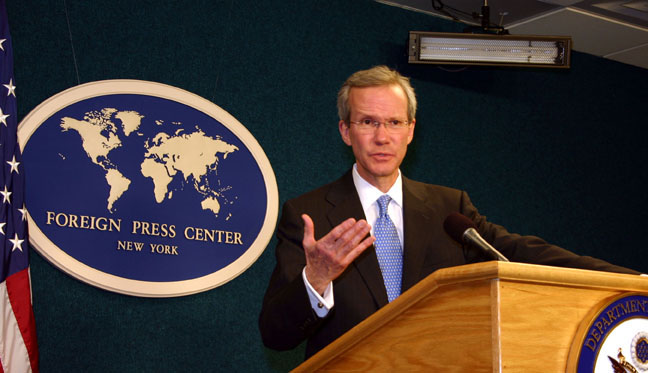Does former Bush administration official David Welch’s alleged contact with the now deposed Qaddafi regime raise legal questions for him and his employer? It depends on who you ask.
Welch, the former State Department official who was instrumental in restoring full diplomatic ties between the U.S. and Libya and is now working for the multi-national company Bechtel, met with senior Libyan officials on Aug. 2, 2011 at the Four Seasons Hotel in Cairo, according to documents obtained by Al Jazeera.
Welch, according to the notes taken by Libyan officials, suggested that “[Gaddafi] should step aside” but “not necessarily relinquish all his powers.” He allegedly offered advice on how to undermine Libya’s rebel movement by providing information to foreign intelligence agencies that they would relay to the Americans and suggested “confidence-building measures” the regime could take to reassure the U.S.
At the close of the meeting, according to one document, Welch promised to “convey everything to the American administration, the Congress and other influential figures.”
It’s that last part — advocating to the U.S. government on behalf of a foreign country, nevermind one the U.S. is engaged against militarily — that makes things a little murky. The Foreign Agents Registration Act, or FARA, requires persons “acting as agents of foreign principals in a political or quasi-political capacity to make periodic public disclosure of their relationship with the foreign principal, as well as activities, receipts and disbursements in support of those activities.”
Bechtel wasn’t working for Libya or the Qaddafi regime per se, but they obviously had a vested interest in keeping the status quo. They recently opened an office in Libya’s central Tripoli “to support expansion of its business in the country.” It was their first office in Libya since the 1960s, and came after the U.S. lifted sanctions on the country in 2003. Gal Luft, director of the Institute for Analysis of Global Security, told Eli Lake of the Washington Times in 2009 that the Libyan market potentially represented a “couple billion dollars” for a company like Bechtel.
“What triggers FARA is when you’ve actually agreed to work as a foreign agent and there’s this broad definition of political activities,” said attorney Joseph Sandler. He said that individuals are allowed to negotiate over the services they could provide, but once they actually start advocating on another country’s behalf they should register within 10 days.
“Technically if you go beyond ‘let’s make a deal’ and actually provide advice on how to deal with the U.S., technically you’re subject to FARA,” Sandler said. “Of course, he probably wasn’t going to offer to lobby.” Sandler added that even if Welch should have registered, the Justice Department rarely prosecutes such cases.
“On the basis of what I’ve read, I do not see any U.S. laws being implicated,” Craig Engle told TPM after reading Al Jazeera’s account.
“What you’re really missing here is the key component of any part of lobbying registration, which is the attempt to influence the U.S.,” Engle said. “Giving advice to another country is not in and of itself foreign agent registrable.”
Another potential legal issue raised by Welch’s work with the Qaddafi regime is whether the expertise that he allegedly offered could be considered a “thing of value” under the Foreign Corrupt Practices Act (FCPA), though there’s no evidence that Welch’s advice was intended as a bribe to the Libyan government.
For their part, the State Department isn’t indicating they see a conflict with what Welch did, with a spokesperson telling Al Jazeera he is “a private citizen” on a “private trip” who was not carrying “any messages from the US government.”
Get the day’s best political analysis, news and reporting from the TPM team delivered to your inbox every day with DayBreaker. Sign up here, it takes just a few seconds.









